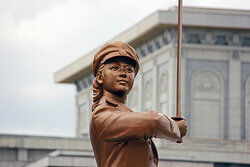Serbian officers under General Livkovic were sent out, and many officers of the future Czechoslovak legions first saw service in this corps.
Unfortunately, while the new Czechoslovak army was recognized by Italy and took its place in the front line, Baron Sonnino, for political reasons, vetoed the formation of similar Yugoslav legions, though General Diaz had consented, and though the Yugoslays interned at Nocera and elsewhere were clamouring to be enrolled.
On the 28th (the same day on which the Czechoslovak Republic was born in Prague) the military command in Zagreb handed over its authority to the National Council, and next day the diet proclaimed the independence of Croatia from Hungary, and assumed control of Fiume.
On the break-up of the State in 1918 the German deputies of this rump Parliament assembled to form the constituent national assembly of German Austria, while in the Czechoslovak and Yugoslav states there were committees from which the German and Italian deputies were excluded, which proceeded to take measures towards forming states.
Its modern history as an independent entity begins with the dramatic collapse of the Austro-Hungarian Monarchy at the close of the World War, and the definitive proclamation of Czechoslovak independence on Oct.
